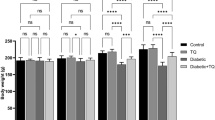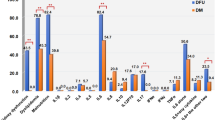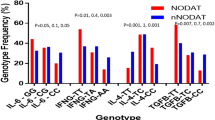Abstract
Neonatal diet may influence the development of type 1 diabetes (T1D) in susceptible individuals through an intestinal mucosal inflammatory response, resulting in loss of self-tolerance. We tested the hypothesis that formula feeding during the neonatal period accelerates the development of T1D in diabetes-prone BioBreeding (BBDP) rats through regulation of CD4+CD25+ regulatory T lymphocytes (Treg) and anti-inflammatory cytokines. BBDP rat pups fed rat milk substitute (RMS) via a “pup-in-the cup” system were compared with mother-fed (MF) rats. The spleen and thymus were analyzed for Foxp3-expressing CD4+/CD25+ T cells. Multiplex enzyme-linked immunosorbent assays (ELISAs) were performed to measure cytokine-induced neutrophil chemoattractant (CINC), tumor necrosis factor α (TNF-α), interferon-gamma (IFN-γ), interleukin (IL)-4, IL-10, and IL-18. Diabetes-free survival, time of disease onset, and Treg/total T lymphocyte ratios were not different. MF pups had higher ileal CINC (p < 0.001) and IL-18 (p = 0.002), but no differences in the liver. There were no differences in ileal cytokine concentrations of 75-d-old rats, but the formula-fed rats had greater liver TNF-α (p < 0.001), IFN-γ, and IL-4 (p < 0.01) and lower IL-10 (p = 0.002) compared with MF animals. Formula versus maternal milk altered the hepatic cytokine profile at 75 d toward an inflammatory pattern but did not result in altered Treg cell frequencies or the development of T1D.
Similar content being viewed by others
Log in or create a free account to read this content
Gain free access to this article, as well as selected content from this journal and more on nature.com
or
Abbreviations
- BBDP:
-
diabetes-prone BioBreeding
- CINC:
-
cytokine-induced neutrophil chemoattractant
- RMS:
-
rat milk substitute
- T1D:
-
type 1 diabetes
- Treg:
-
CD4+CD25+ regulatory T lymphocytes
References
Vaarala O 2002 The gut immune system and type 1 diabetes. Ann N Y Acad Sci 958: 39–46
Leslie RD, Elliott RB 1994 Early environmental events as a cause of IDDM. Evidence and implications. Diabetes 43: 843–850
Meddings JB, Jarand J, Urbanski SJ, Hardin J, Gall DG 1999 Increased gastrointestinal permeability is an early lesion in the spontaneously diabetic BB rat. Am J Physiol 276: G951–G957
Neu J, Reverte CM, Mackey AD, Liboni K, Tuhacek-Tenace LM, Hatch M, Li N, Caicedo RA, Schatz DA, Atkinson M 2005 Changes in intestinal morphology and permeability in the biobreeding rat before the onset of type 1 diabetes. J Pediatr Gastroenterol Nutr 40: 589–595
Vaarala O 1999 Gut and the induction of immune tolerance in type 1 diabetes. Diabetes Metab Res Rev 15: 353–361
Secondulfo M, Iafusco D, Carratù R, deMagistris L, Sapone A, Generoso M, Mezzogiomo A, Sasso FC, Cartenì M, De Rosa R, Prisco F, Esposito V 2004 Ultrastructural mucosal alterations and increased intestinal permeability in non-celiac, type I diabetic patients. Dig Liver Dis 36: 35–45
Crisa L, Mordes JP, Rossini AA 1992 Autoimmune diabetes mellitus in the BB rat. Diabetes Metab Rev 8: 4–37
Rossini AA 2004 Autoimmune diabetes and the circle of tolerance. Diabetes 53: 267–275
Poussier P, Ning T, Murphy T, Dabrowski D, Ramanathan S 2005 Impaired post-thymic development of regulatory CD4+25+ T cells contributes to diabetes pathogenesis in BB rats. J Immunol 174: 4081–4089
Malaisse WJ, Olivares E, Laghmich A, Ladriere L, Sener A, Scott FW 2000 Feeding a protective hydrolysed casein diet to young diabetic-prone BB rats affects oxidation of L[U-14C]glutamine in islets and Peyer's patches, reduces abnormally high mitotic activity in mesenteric lymph nodes, enhances islet insulin and tends to normalize NO production. Int J Exp Diabetes Res 1: 121–130
Hall WG 1975 Weaning and growth of artificially-reared rats. Science 190: 1313–1315
Auestad N, Korsak RA, Bergstrom JD, Edmond J 1989 Milk-substitutes comparable to rat's milk; their preparation, composition, and impact on development and metabolism in the artificially reared rat. Br J Nutr 61: 495–518
Potsic B, Holliday N, Lewis P, Samuelson D, DeMarco V, Neu J 2002 Glutamine supplementation and deprivation: effect on artificially reared rat small intestinal morphology. Pediatr Res 52: 430–436
Patel MR, DeMarco VG, Clare-Salzer M, Li YY, Neu J 2002 Indomethacin, dexamethasone, and intestinal damage in infant rats. J Pediatr Gastroenterol Nutr 35: 154–161
Åkerblom HK, Vaarala O, Hyöty H, Ilonen J, Knip M 2002 Environmental factors in the etiology of type 1 diabetes. Am J Med Genet 115: 18–29
LaPorte RE, Tajima N, Akerblom HK, Berlin N, Brosseau J, Christy M, Drash AL, Fishbein H, Green A, Hamman R 1985 Geographic differences in the risk of insulin-dependent diabetes mellitus: the importance of registries. Diabetes Care 8: 101–107
Atkinson MA, Eisenbarth GS 2001 Type 1 diabetes: new perspectives on disease pathogenesis and treatment. Lancet 358: 221–229
Kostraba JN, Cruickshanks KJ, Lawler-Heavner J, Jobim LF, Rewers MJ, Gay EC, Chase HP, Klingensmith G, Hamman RF 1993 Early exposure to cow's milk and solid foods in infancy, genetic predisposition, and risk of IDDM. Diabetes 42: 288–295
1994 Infant feeding practices and their possible relationship to the etiology of diabetes mellitus. American Academy of Pediatrics Work Group on Cow's Milk Protein and Diabetes Mellitus. Pediatrics 94: 752–754
Paronen J, Knip M, Savilahti E, Virtanen SM, Ilonen J, Akerblom HK, Vaarala O 2000 Effect of cow's milk exposure and maternal type 1 diabetes on cellular and humoral immunization to dietary insulin in infants at genetic risk for type 1 diabetes. Finnish Trial to Reduce IDDM in the Genetically at Risk Study Group. Diabetes 49: 1657–1665
Wilson DM, Buckingham B 2001 Prevention of type 1a diabetes mellitus. Pediatr Diabetes 2: 17–24
Westerholm-Ormio M, Vaarala O, Pihkala P, Ilonen J, Savilahti E 2003 Immunologic activity in the small intestinal mucosa of pediatric patients with type 1 diabetes. Diabetes 52: 2287–2295
Hardin JA, Donegan L, Woodman RC, Trevenen C, Gall DG 2002 Mucosal inflammation in a genetic model of spontaneous type I diabetes mellitus. Can J Physiol Pharmacol 80: 1064–1070
Scott FW, Rowsell P, Wang GS, Burghardt K, Kolb H, Flohe S 2002 Oral exposure to diabetes-promoting food or immunomodulators in neonates alters gut cytokines and diabetes. Diabetes 51: 73–78
Barreau F, Ferrier L, Fioramonti J, Bueno L 2004 Neonatal maternal deprivation triggers long term alterations in colonic epithelial barrier and mucosal immunity in rats. Gut 53: 501–506
Rossini AA, Handler ES, Mordes JP, Greiner DL 1995 Human autoimmune diabetes mellitus: lessons from BB rats and NOD mice—caveat emptor. Clin Immunol Immunopathol 74: 2–9
Author information
Authors and Affiliations
Corresponding author
Additional information
Funded by NIH RO3 A142288.
Rights and permissions
About this article
Cite this article
Caicedo, R., Li, N., Robert, C. et al. Neonatal Formula Feeding Leads to Immunological Alterations in an Animal Model of Type 1 Diabetes. Pediatr Res 63, 303–307 (2008). https://doi.org/10.1203/PDR.0b013e31815ed662
Received:
Accepted:
Issue date:
DOI: https://doi.org/10.1203/PDR.0b013e31815ed662



